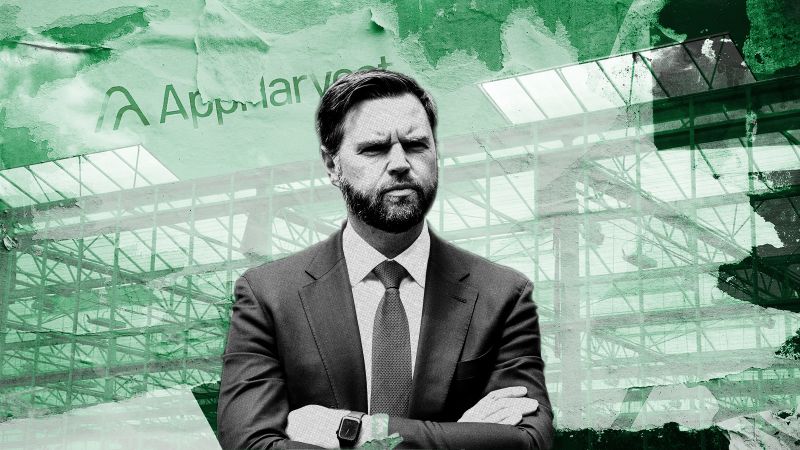JD Vance, a venture capitalist, believed that a business should not only be profitable but should also benefit American communities. With this principle in mind, he invested in AppHarvest, a startup aimed at revolutionizing farming in Eastern Kentucky. Vance served as an early investor, board member, and public spokesperson for the indoor agriculture company. He touted AppHarvest as not just a good investment opportunity, but a business that was making a positive impact on the world. However, last year, AppHarvest declared bankruptcy with hundreds of millions of dollars in debt, highlighting the company’s rise and fall.
The collapse of AppHarvest and Vance’s involvement in it raised questions about his reputation as a champion for the working class. Vance’s image as a supporter of working-class Americans helped him gain prominence in the Republican party, particularly during his association with Donald Trump. A CNN investigation into public records and interviews with former employees revealed that AppHarvest not only failed as a business due to its pursuit of rapid growth but also provided a challenging work environment for many blue-collar workers in Kentucky, contradicting Vance’s promises to support them.
AppHarvest’s bankruptcy shed light on the challenges faced by companies aiming to combine profit with social impact and community support. Vance’s investment in the startup, while well-intentioned, ultimately did not deliver the promised benefits to the local community and workers. This failure serves as a cautionary tale for investors and entrepreneurs seeking to align business success with societal good. The case of AppHarvest underscores the importance of thorough due diligence and sustainable growth strategies for businesses aiming to make a positive difference while remaining financially viable.
The relationship between venture capitalism, community development, and social impact is complex and multifaceted. While investors like JD Vance may have good intentions in supporting businesses that promise to benefit American communities, the reality of navigating the business world can present unexpected challenges and outcomes. The experience of AppHarvest highlights the importance of carefully balancing financial considerations with social responsibility and sustainable practices to ensure long-term success and positive impacts on communities. It also underscores the need for transparency, accountability, and ethical leadership in the realm of venture capitalism and entrepreneurship.
Overall, the story of AppHarvest and JD Vance’s involvement in the company serves as a cautionary tale about the complexities and pitfalls of combining business success with social impact. The failure of the startup, despite initial promise and investment, underscores the importance of aligning business practices with community needs and sustainable growth strategies. It also raises questions about the role of venture capitalists in promoting social good and the responsibilities that come with investing in companies that claim to benefit society. Moving forward, it is crucial for investors, entrepreneurs, and policymakers to carefully consider the implications of their actions on communities and strive to create businesses that not only generate profits but also contribute positively to society as a whole.


